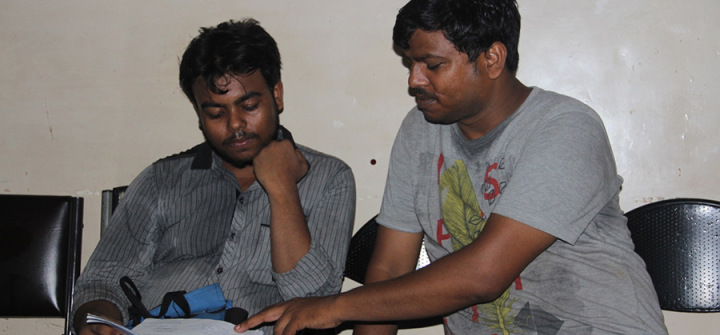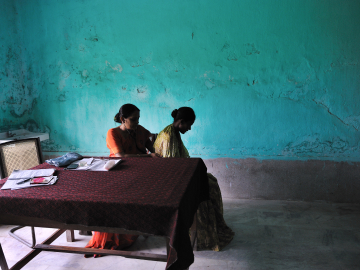Medicine in India: The Dark Underbelly
Face clouded with anxiety and helplessness, a man walked into the Bombay Medical Aid Foundation. He had traveled from his village in Bihar to Mumbai, a distance of over 1,000 miles.
He and his family of 5 eke out a living on a paltry income of 5,000 rupees ($70) a month. 5 years ago, he had raised money from his entire village and spent it at a nearby hospital, where surgeons told him they removed his appendix. Today, he is back in Mumbai with the same abdomen pain, begging from door to door, hoping someone will fund his surgery. He needs surgery again because 5 years ago, this man had been duped by corrupt medical practitioners. He later learned that they had given him a couple of stitches under anesthesia and sent him home, his appendix still intact (as proved by new scans), and his pockets empty.
While working with a medical trust in Mumbai, I encountered a number of patients with similar shocking and distressing stories. In India, ruthless and mercenary medical practitioners exploit vulnerable patients. Unnecessary procedures and avoidable surgical operations have become commonplace. Laboratories and doctors conspire to recommend unnecessary tests or manufacture false results (for example, a blood report with low vitamin levels) to extend the patient’s course of treatment—and payments.
Hospitals bent on boosting revenue compel or pressure doctors to order more tests, even though they may be unnecessary. Hospitals set targets for doctors to increase revenue, ranging from quotas to hospitalize a certain number of patients to sending a certain number for MRIs and CT scans. These complex machines are an expensive investment, and private hospitals are keen on recovering costs quickly. On top of this, doctors receive monetary incentives, such as a commission for every patient they send for further check-ups. Setting such targets, driven by profit instead of need, demeans this noble profession.
The practice of referring a patient to several doctors with the express intent to obtain a commission is called the “cut practice.” For instance, a specialist presents a monetary incentive to a general practitioner so that he may receive a steady supply of patients in order to sustain his business, tainting the system for patients. This malpractice is so deeply ingrained in the profession that it often pulls in otherwise ethical doctors, who feel they couldn’t survive professionally if they refuse to participate.
The “donation” system in medical colleges is partly to blame. By paying an exorbitant amount of money, often obtained through loans, students can procure a seat for a medical degree. Once these students finish school, they are in a rush to recover their expenses and are thus easily pressurized into corrupt practices like taking and giving cuts from laboratories or other doctors. Doctors say there are solutions to these extremely deep-seated problems, but they would require a drastic change in mindsets.
For instance, making the medical college admissions process transparent and merit-based could nip the problem in the bud. Simultaneously, solutions require improving the infrastructure, equipment and skilled workforce of affordable government-funded hospitals. If these government hospitals offer services on par with those of private hospitals, illiterate and poor patients will have access to quality, affordable health care. There is also a need to increase doctors’ salaries, as they receive only a small fraction of patient payments to hospitals. Finally, the country needs a standardized rate structure to empower patients, and regulation of undue profiteering. Curbing corruption is possible if the government and law enforcement agencies hold doctors and hospital management accountable. Strict law enforcement is an effective and necessary deterrent to malpractice.
While many doctors in India practice ethically, staying true to their values while watching their corrupt counterparts accumulate wealth, it is terrifying to believe that these unethical practices exist at all. In the words of Anand Gokani, an esteemed doctor in India (and the great grandson of Mahatma Gandhi), “To practice medicine is a calling of the soul and not a choice one makes to earn monetary wealth. To practice medicine with the sole purpose of earning money is to lose the very soul of the profession and with it the compassion, empathy and altruism it demands. Such a practitioner is undeserving of the high degree of respect, adulation and awe that the profession garners for it's membership.” Doctors and health workers who uphold ethics in a system rife with corruption are the true heroes of India’s medical system.
Jinali Mody is a sophomore at St Xavier's College in Mumbai with a deep interest in public health issues in her country, particularly the corruption that plagues the medical industry. She had the opportunity to interview patients through her work with the Bombay Medical Aid Foundation.
Join the thousands of subscribers who rely on Global Health NOW summaries and exclusive articles for the latest public health news. Sign up for our free weekday enewsletter, and please share the link with friends and colleagues: Subscribe to GHN
Two men working to procure funding for their wives’ chemotherapy treatments. Images by Jinali Mody, courtesy of the Bombay Medical Aid Foundation, Bombay Hospital.




